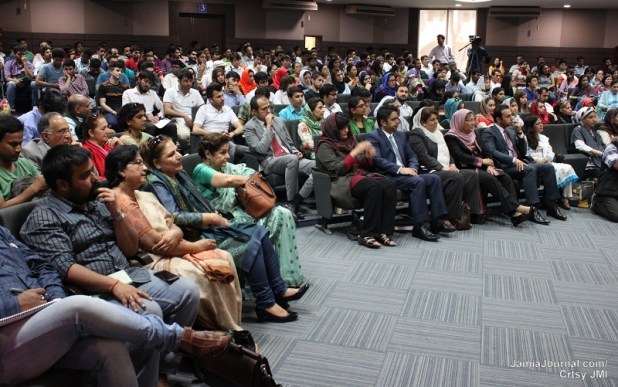A two-day SAARC Conference on “Gender, Community and Violence: Changing Mindsets for Empowering the women of South Asia” was inaugurated by Ms. Rula Ghani, the First Lady of the Islamic Republic of Afghanistan, [at Faculty of Engineering Auditorium, JMI, Wednesday, April 15, 2015.]
Delivering her Keynote Address, Ms. Rula Ghani, who is known for her social service in Afghanistan, said that development of any society would come through collective efforts by men and women to improve the quality of their lives. It is through relentless activism, dedication and blind courage that women could help change the mindsets of people, she said. She went on to discuss the case study of Farkhunda, a 27-year old woman from Kabul, who was subjected to horrendous barbarity in the month of March this year. She had dared to question religious credentials of a group engaged in selling of amulets by exploiting the vulnerability of worshipers seeking succor and salvation.
Speaking on the occasion, Smt. Lalitha Kumaramangalam, Chairperson, National Commission for Women, Government of India said that we needed to eschew Band-Aid approach to seek solutions to our social problems. She argued in favour of long term solutions to evade the problems pertaining to violence against women in South Asia. In our march towards economic development, we needed to follow the time tested cultures of Asia that promoted politeness and mutual respect for each other, she said. Women empowerment, she felt, would mean equal opportunities and equal access to all. Both men and women, she emphasized, have to be partners in growth to make women empowerment sustainable.
Presenting the concept note of the international conference, Prof. Veena Sikri, Ambassador, Founder & Convenor, South Asia Women’s Network (SWAN) and Vice-Chairperson, South Asia Foundation (SAF-India) said that exclusion of women was hampering progress and an integrated approach was required to eliminate gender inequality that was entrenched in our mindsets. It was important, she felt, that men are brought on board in becoming partners to undermine the mindsets rooted in patriarchy and hegemonic practices. Every institution needed to carry out gender-audit to sensitize itself to the limitations that bedevil it. Women, she said, could play a very constructive role in seeking solutions to conflict-ridden solutions.
Highlighting Jamia’s contribution, Prof. Talat Ahmad, Vice-Chancellor, Jamia Millia Islamia said that the Conference in Jamia was an indication about how strongly the institution felt in terms of women empowerment and gender equity. He said that it was necessary that women through education interrogated the inequalities around them and offered remedial measures. He rooted for equal opportunities for women in every walk of life. He drew the attention of the audience to the initiatives launched by the Outreach Programme of Jamia with regard to women-empowerment and gender equity that manifested in the establishment of an All-Women Canteen in the university besides initiatives for women in the neighbourhood to enhance their employability.

Prof. Mohammad Shafiq, Dean, Faculty of Social Sciences, JMI welcomed the delegates from SAARC nations Afghanistan, Bangladesh, Bhutan Maldives, Myanmar, Nepal, Pakistan and Sri Lanka and wished them a very productive and intellectual engaging stay on the campus.
The participants included academicians, journalists, lawyers, activists and policy makers from India and abroad.
Dr. Sabiha Husain, Associate Professor, Dr. K.R. Narayan Centre for Dalit & Minorities Studies, JMI presented the theme of the Conference.
Prof. Rumki Basu, Director, Sarojini Naidu Centre for Women’s Studies, Jamia Millia Islamia proposed the votes of thanks.
[Official Jamia press release dated April 15, 2015]
 Jamia Journal Independent Student-run News Website of Jamia Millia Islamia (a Central University)
Jamia Journal Independent Student-run News Website of Jamia Millia Islamia (a Central University)

